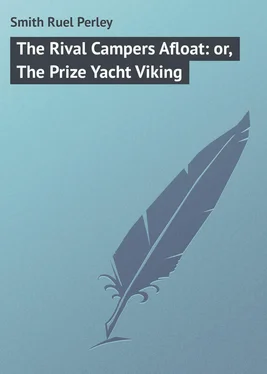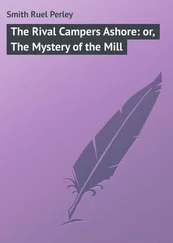Ruel Smith - The Rival Campers Afloat - or, The Prize Yacht Viking
Здесь есть возможность читать онлайн «Ruel Smith - The Rival Campers Afloat - or, The Prize Yacht Viking» — ознакомительный отрывок электронной книги совершенно бесплатно, а после прочтения отрывка купить полную версию. В некоторых случаях можно слушать аудио, скачать через торрент в формате fb2 и присутствует краткое содержание. Жанр: foreign_prose, Морские приключения, на английском языке. Описание произведения, (предисловие) а так же отзывы посетителей доступны на портале библиотеки ЛибКат.
- Название:The Rival Campers Afloat: or, The Prize Yacht Viking
- Автор:
- Жанр:
- Год:неизвестен
- ISBN:нет данных
- Рейтинг книги:4 / 5. Голосов: 1
-
Избранное:Добавить в избранное
- Отзывы:
-
Ваша оценка:
- 80
- 1
- 2
- 3
- 4
- 5
The Rival Campers Afloat: or, The Prize Yacht Viking: краткое содержание, описание и аннотация
Предлагаем к чтению аннотацию, описание, краткое содержание или предисловие (зависит от того, что написал сам автор книги «The Rival Campers Afloat: or, The Prize Yacht Viking»). Если вы не нашли необходимую информацию о книге — напишите в комментариях, мы постараемся отыскать её.
The Rival Campers Afloat: or, The Prize Yacht Viking — читать онлайн ознакомительный отрывок
Ниже представлен текст книги, разбитый по страницам. Система сохранения места последней прочитанной страницы, позволяет с удобством читать онлайн бесплатно книгу «The Rival Campers Afloat: or, The Prize Yacht Viking», без необходимости каждый раз заново искать на чём Вы остановились. Поставьте закладку, и сможете в любой момент перейти на страницу, на которой закончили чтение.
Интервал:
Закладка:
He handed young Brackett a ten-dollar bill, which the boy pocketed promptly. It seemed a queer transaction, but he was satisfied.
“And, say, don’t mention my name,” said Mr. Carleton, carelessly. “You see, if a man that has any money is known to be looking for a particular boat, they always put the price up.”
“All right, I won’t,” replied Harry Brackett.
“I hate to tackle that fellow, Harvey,” he thought, as he turned the matter over in his mind. “But it’s worth trying for two hundred dollars.”
Then, in great elation, he proceeded to beat Mr. Carleton at the game; though that person’s intimate friends, wherever they might be, would have laughed at his attempts to make poor shots instead of good ones. It pays to be a loser sometimes, was his way of looking at it. At least, he and Harry Brackett parted excellent friends.
The day came in warm and pleasant down in the Thoroughfare, and the boys were early astir.
“Any more swimming to do to-day, Henry?” inquired George Warren, as the fires were building in the cabin stoves, preparatory for breakfast.
“Only a plunge for one of us,” answered Henry. “I’ll do that. And that reminds me; I’d better do it before breakfast, for one doesn’t want to swim right after eating. Just throw us a line and trip your anchor, and we will draw you up close astern of the Surprise , opposite us.”
The Warren boys did as he requested, and the two boats were soon almost side by side, astern of the sunken yacht. Then Henry Burns, getting George Warren to unhook the tackle from the throat of the mainsail of the Spray , did likewise aboard the Viking . Taking the two pieces of tackle in hand, while the boys let the halyards run free, he ducked down at the stern of the sunken yacht and hooked in the tackle to one of the stout ropes that had been passed under the boat’s keel.
“That will do till after breakfast,” he said, coming to the surface and clambering out aboard the Viking .
“No, let’s have a pull on the thing now,” exclaimed Harvey. “I’m eager to see the old Surprise above water – that is, if she is going to float.”
“All right,” said Henry Burns. “Come on, fellows.”
The boys on each yacht caught hold of the halyards with a will, and hoisted as they would have done to raise the throat of the mainsail. The tackle, hooked on to the stern of the sunken yacht, was at first as so much dead weight on their hands. Then, of a sudden, it began to yield ever so little, and the halyards began to come home.
“She’s coming up, boys!” cried Harvey, gleefully. “Pull now, good and hard.”
But the next moment something seemed to have given way. The ropes ran loose in their hands, and the boys that held the ends sprawled over on the decks.
“Oh, confound it! The rope must have slipped off the stern,” exclaimed Harvey.
“No, it hasn’t,” cried Henry Burns, joyfully. “There she comes to the surface. Look! Look! Quick, get in the slack of the ropes and make them fast.”
The yacht buoyed by the numerous casks and lifted by the tackle, had, indeed, hung on bottom only for a moment. Then, released by the strain from the ledge and the seaweeds and slime that had gathered about it, it had come to the surface with a rush. Loaded with ballast as it was, however, and with the weight of water still within it, it could not rise above the surface. Its rail showed just at the top of water, and the cabin deck slightly above.
“Hooray! that’s great!” cried Harvey, slapping Henry Burns on the shoulder. “That will do now. Let’s have some breakfast.”
“It’s about time,” said young Joe.
They spent little time at breakfast, however, for they were eager to resume. With each yacht alongside the Surprise , they began bailing that yacht out with pails tied to ropes, which they slung aboard. When they had lightened her sufficiently, two of them sprang over into the cockpit and bailed to better advantage there.
Then, while they took turns at the pump, the others got up a part of the floors, and began lifting out the pieces of pig-iron ballast, passing them aboard the other two yachts. Finally they rigged the tackle on to the mast of the Surprise and, with great care so as not to wrench the boat, lifted it clear and lowered it into the water alongside.
Now it would be safe to beach the yacht; and this they did at high tide that afternoon, towing it in on to a beach that made down in a thin strip between the ledges, and drawing it up as far as it would float, where they made it fast with a line passed ashore to a small spruce-tree.
It had been a good job, and Henry Burns surveyed it proudly. But he merely remarked to young Joe, “Well, she’s up, isn’t she?”
The yacht Surprise was at present a sorry-looking sight. The bottom was very foul, covered with long streamers of slimy grass and encrusted with barnacles. These had fastened, too, upon the mast and spars; and inside the yacht was in the same condition. The sails were slime-covered and rotten. Everything was snarled and tangled, twisted and broken about the rigging. The bowsprit had been broken off short in the collision of the fall before. This, with the carrying away of the bobstay, necessitated the taking out of the mast now. Rust from the iron ballast had stained much of the woodwork.
“There’s a job,” said Harvey, eying the wreck. “There’s a good week’s work, and more, in scraping and cleaning her, and cleaning that ballast. We wanted to get to fishing, too.”
“Well, you go ahead and leave us to begin the work,” said Joe Hinman, speaking for himself and the crew. “It’s no more than fair that we should do it, seeing as we are to have the use of the yacht this summer. Just leave us a little coffee and some cornmeal and some bread and a piece of pork and one of the frying-pans. We’ll catch fish, and live down here for a week, till you come for us.”
“Where will you stay?” inquired Harvey. “The other yacht is going back to Southport, you know.”
“Up in the old shack there,” replied Joe, pointing back to where there stood a tumble-down shelter that had been used at some time to store a scant crop of hay that the island produced. “Give us a blanket apiece and we’ll get along. You’ve got to go back to the harbour before you go fishing, and you can get ours down at the camp.”
“All right,” said Harvey, “I guess we’ll do it. You can run things, Joe, and there won’t anybody trouble you.”
So with this prophecy – which might or might not hold good – Harvey proceeded to install his crew in temporary possession of the yacht Surprise , and of the little island where they had dragged it ashore, which was one of the chain of narrow islands that lay off Grand Island.
Late that afternoon the two yachts sailed out of the Thoroughfare and went on to Southport, leaving the crew masters of their island domain and of the wreck.
The next morning Henry Burns and Jack Harvey were up before the sun, for Harvey had waked and found a light west wind blowing, and this was a fair one for the trip down the bay. They roused the campers in the tent on the point, and soon Tom and Bob, their canoe loaded with blankets and provisions, were paddling out to the Viking . They made two trips, and then, leaving the canoe up on shore alongside the tent, fastened that good and snug. Henry Burns took them aboard the Viking in the tender.
The mooring which they had put down for the season was slipped, the sail hoisted, a parting toot-toot sounded on the great horn in the direction of the Warren cottage, and the Viking’s voyage in search of work had begun.
The course the Viking was now shaping was about due south from the harbour they had just left. Far away to the southward, some twenty-two miles distant, lay the islands they were seeking, at the seaward entrance to East Samoset Bay. Some six miles ahead on the course lay a group of small islands, on one of which was erected a lighthouse. Beyond these, to the southwest, a few miles away, lay two great islands, North Haven and South Haven. Off to the eastward from the foot of these, across a bay of some six miles’ width, lay Loon Island, with little Duck Island close adjacent.
Читать дальшеИнтервал:
Закладка:
Похожие книги на «The Rival Campers Afloat: or, The Prize Yacht Viking»
Представляем Вашему вниманию похожие книги на «The Rival Campers Afloat: or, The Prize Yacht Viking» списком для выбора. Мы отобрали схожую по названию и смыслу литературу в надежде предоставить читателям больше вариантов отыскать новые, интересные, ещё непрочитанные произведения.
Обсуждение, отзывы о книге «The Rival Campers Afloat: or, The Prize Yacht Viking» и просто собственные мнения читателей. Оставьте ваши комментарии, напишите, что Вы думаете о произведении, его смысле или главных героях. Укажите что конкретно понравилось, а что нет, и почему Вы так считаете.












